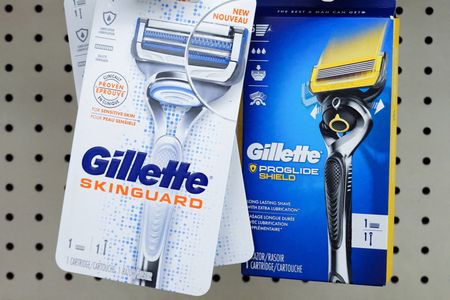By Jessica DiNapoli and Richa Naidu
NEW YORK (Reuters) – Procter & Gamble has overhauled its supply chain for the tiny, extra-thin strips of stainless steel in its Gillette razors to source from India, a move expected to help protect its margins from any tariffs U.S. President-Elect Donald Trump may impose.
The stainless steel the Gillette-brand razor maker uses is highly specialized to prevent nicks and cuts and is only produced in large quantities by a handful of companies, none of which are located in the U.S., P&G has told the U.S. Commerce Department in public filings.
A Reuters analysis of import records over the past four years shows that P&G has shifted where it buys the stainless steel for its top grooming brands in the United States, its biggest market, to a cheaper Indian manufacturer, a move that may help it offset higher costs in Trump’s second term.
The Cincinnati-based company now primarily obtains the steel for Gillette from New Delhi-based Jindal Stainless, according to the U.S. import records for P&G subsidiaries, including Gillette.
Investors view P&G as a top operator in the competitive consumer products industry, with its margins exceeding those of rivals like Kimberly-Clark.
It’s a pattern P&G hopes to keep after Trump takes office in early 2025. During his first term, P&G faced $1.4 billion in external costs including tariffs that ate into profits.
A P&G spokesperson confirmed that the company has worked with Jindal, adding that details of its relationships with business partners are competitively sensitive. A spokesperson added that “it would not be accurate to point to cost as the sole driver of any sourcing decision.”
Previously P&G bought mostly pricier Japanese and Swedish steel for Gillette, according to the import records, provided exclusively to Reuters by ImportYeti. Hefty tariffs during Trump’s first term added to the costs of Japanese and Swedish steel, although P&G eventually secured an exemption from them.
Trump, who has said “tariff” is his favorite word, has pitched a fresh roster of tariffs, targeting China, Mexico and Canada, putting consumer-product makers on the defensive.
P&G’s Chief Financial Officer Andre Schulten said during meetings with investors on November 21 that the company will have to adjust its supply chain as it sees how Trump implements tariffs. Despite years of underperformance, recent strategies to improve its grooming business have been working, the division’s CEO, Gary Coombe, said.
Making steel for shaving razors is labor-intensive, giving Indian manufacturers an edge on cost, said Markus Moll, managing director at Steel & Metals Market Research, an independent market research company. He estimates Jindal’s steel is about 20-25% cheaper than competitors.
He added that Jindal has been manufacturing the material for about 15 to 20 years for Indian clients.
Jindal, which says it is the world’s biggest maker of stainless steel for razor blades, has mainly supplied non-U.S. markets, an industry executive not permitted to speak to the media, said. Although Jindal has long had a relationship with P&G, P&G’s imports from Jindal to the U.S. began in 2022, according to the records from ImportYeti, which compiles bills of lading. P&G imported at least 4,283,569 kilograms (4,721 U.S. tons) of stainless steel from Jindal over the past 36 months, according to the data.
Jindal did not comment specifically on the steel used in razor blades, P&G or its Gillette razors. Abhyuday Jindal, managing director of Jindal Stainless, said in a statement that the manufacturer works with its customers to “create value in their business and using pricing as a lever is our last priority.”
Earlier this year, P&G said Jindal was a top supplier that “consistently performed at high levels,” according to an internal company blog. The P&G spokesperson said that P&G constantly seeks new suppliers globally that can meet its needs, and that very few do. P&G has not made any substantive changes to its core suppliers, the spokesperson said.
According to the data reviewed by Reuters, P&G has cut back on its imports from Japan’s Proterial and Sweden’s Alleima. In this year through October, its imports from Proterial were nearly 59% less than in 2023, while P&G has received no steel shipments from Alleima this year, the data shows.
Gillette has been working with Proterial for more than 50 years, and Alleima for over 20, according to filings with the U.S. Commerce Department.
Alleima did not respond to requests for comment. Proterial declined to comment.
Grooming, P&G’s smallest business by revenue, has faced years of struggles. During the pandemic, sales declined as men grew beards and shaved less. Before that, start-ups like Dollar Shave Club and Harry’s were able to grab valuable market share from pricier Gillette. A four-pack of Gillette Labs Men’s Razor Blade refills sells for nearly $29 at Target.com, according to the retailer’s website.
(Reporting by Jessica DiNapoli in New York and Richa Naidu in London; Editing by Vanessa O’Connell and Anna Driver)
